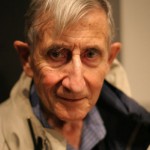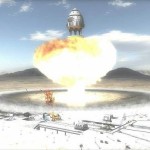Two good friends of mine have both referred me recently to articles by Freeman Dyson.  One pointed me at an article in the NY Times and the other sent me to an article in John Brockman’s site, The Edge.
Both of my friends have some reservations about global climate change and they’ve directed me to these articles, I think, because Freeman Dyson is also skeptical of climate change and he’s an extremely smart and well respected scientist. So, I read these two articles carefully.
Freeman Dyson hasn’t converted me.  Sorry.   That he is world-class brilliant is obvious.  But I haven’t been convinced that he’s so brilliant that he’s been able to see the correct answers and that the majority of the world’s scientists have been, strangely, missing them.
In the Edge article, he trashes the use of climate models saying the following:
I have studied the climate models and I know what they can do. The models solve the equations of fluid dynamics, and they do a very good job of describing the fluid motions of the atmosphere and the oceans. They do a very poor job of describing the clouds, the dust, the chemistry and the biology of fields and farms and forests. They do not begin to describe the real world that we live in. The real world is muddy and messy and full of things that we do not yet understand.
For someone wanting to believe that the climate scientists are just making it all up, it would be easy to gather this sort of thing to yourself and snuggle in it.
But, flash as it sounds, it’s not right.
First, climate modelers don’t just develop a model and then start it from today and run it forward.  They develop it and then prime it with data from the past and then run it forward to the present and then see how it did predicting the weather in a period where we know what the correct outcome was.  And then they iteratively tweak and adjust the model and run it again and again until it does a decent job before they turn it lose predicting future events.
Second, we’re not talking about one model here.  We’re talking about many models – all independently developed and all manifesting a good deal of agreement with each other in their predictions.
And, third, and most telling, is that Dyson’s implication that these models are exaggerating the danger is badly off.   In fact, in nearly all cases, the climatic changes predicted by the models over the last decade have been consistent in under estimating the amounts and rates of change.  If anything, these models have been conservative in their predictions compared to what’s actually come to pass.
That’s not exactly a reason to decide that Global Climate Change is being exaggerated.
Concerning the scientists who develop the models, he says:
It is much easier for a scientist to sit in an air-conditioned building and run computer models, than to put on winter clothes and measure what is really happening outside in the swamps and the clouds. That is why the climate model experts end up believing their own models.
I’m sorry, but that isn’t scientific discussion – it’s simply a personal attack.  And, yes, some folks do work in buildings and do theory while others go out and get their hands dirty.  But these both, theoretical and practical, are vital and real parts of science.   Dyson himself, for example, has spent the last 50+ years at at the Institute for Advanced Study in Princeton, NJ.  And that’s a pretty theoretical place, if there ever was one.
There are arguably more scientists out in the field today, getting their hands dirty studying the climate than there has ever been before.  But, if you uncritically accept Dyson’s attack, you’d assume that most climate scientists just sitting in their air-conditioned offices playing with computers and adjusting their climate models and ignoring the messy real world.
How can anyone imagine that such attacks improve the scientific discussion climate?
Dyson is brilliant – no doubt.  But, he’s also widely acknowledged to like being the heretic.  If everyone goes left, he’s the one who will often go right.  And there’s a place for that in the world of science to keep everyone from getting complacent.  But when people know that this has been his habitual response across an entire career, one wonders whether his current contrarianism is based on convictions or if he’s just acting out his signature response?
If you think I’m exaggerating a bit, read the two articles and see how many times he’s played the contrarian in his career.
The Nobel physics laureate Steven Weinberg admires Dyson’s physics — he says he thinks the Nobel committee fleeced him by not awarding his work on quantum electrodynamics with the prize — but Weinberg parts ways with his sensibility:
“I have the sense that when consensus is forming like ice hardening on a lake, Dyson will do his best to chip at the ice.”
Oliver Sacks, a good friend of Dyson, said this about Dyson:
“a favorite word of Freeman’s about doing science and being creative is the word ‘subversive.’ He feels it’s rather important not only to be not orthodox, but to be subversive, and he’s done that all his life.”
Of himself, Dyson says this about how he reacted in college when he found his muse when reading J. B. S. Haldane’s work:
“Haldane was even more of a heretic than I am,” he says. “He really loved to make people angry.”
And has Dyson always been right? Â It would certainly be a lot more telling if he had been.
 But no, he’s gone off the rails once or twice.   For example, he opposed the Space Station and the Hubble Telescope. And he was fully on-board with the Air Force’s Orion Project - a project to develop spacecraft that flew by exploding atomic bombs behind themselves to get a ‘push’.
But no, he’s gone off the rails once or twice.   For example, he opposed the Space Station and the Hubble Telescope. And he was fully on-board with the Air Force’s Orion Project - a project to develop spacecraft that flew by exploding atomic bombs behind themselves to get a ‘push’.
The Edge article is in Dyson’s own words and is excerpted from his latest book, Many Colored Glass: Reflections on the Place of Life in the Universe.
The NY Times article, on the other hand, was written by Nicholas Dawidoff.  Nicholas’ previous writing seems to have largely involved baseball. He’s not suited to the material and his story rambles a bit as in the following excerpt:
These days, most of what consumes Dyson is his writing. In a recent article, he addressed the issue of reductionist thinking obliquely, as a question of perspective. Birds, he wrote, “fly high in the air and survey broad vistas.” Frogs like him “live in the mud below and see only the flowers that grow nearby.” Whether the topic is government work, string theory or climate change, Dyson seems opposed to science making enormous gestures.
Jeez, I think I know what reductionist thinking refers to but, after reading this, I seriously doubt that Dawidoff does.
This, of course, shouldn’t be a reflection on Dyson’s qualifications but it is a reflection of how lightly all of this is taken by an organization no less weighty that the NY Times.
Dyson’s admirers tout him as first-class systems thinker – a big picture man.  But, frankly, I have my doubts when he says things like the following:
“the move of the populations of China and India from poverty to middle-class prosperity should be the great historic achievement of the century. Without coal it cannot happen.”
India and China’s rush to try to live like we Americans live is unsupportable. The planet simply doesn’t have sufficient resources.  Signs of the strain are appearing everywhere around us – but he thinks it is all the best thing since sliced bread.
Freeman Dyson is brilliant, as I’ve said before, and he’s got a lot of credibility based on his earlier career work (atomic bomb spaceships aside). But, he’s also known as a habitual maverick and he’s got some seriously loose cannon ideas about climate science.  I personally think he’s irresponsible to wade into such a critical subject area armed with no more of a purpose for being there than, as he says himself:
…I am not speaking as a scientist. I am speaking as a story-teller, and my predictions are science-fiction rather than science. The predictions of science-fiction writers are notoriously inaccurate. Their purpose is to imagine what might happen rather than to describe what will happen. I will be telling stories that challenge the prevailing dogmas of today. The prevailing dogmas may be right, but they still need to be challenged. I am proud to be a heretic. The world always needs heretics to challenge the prevailing orthodoxies. Since I am heretic, I am accustomed to being in the minority. If I could persuade everyone to agree with me, I would not be a heretic.
His credibility as a world-class scientist means that his ideas are taken as valid criticisms of the science of Global Climate Change and that’s just not helpful now.  Yes, we will always need the contrarian viewpoint to keep us honest. But Dyson, with his credibility, should spend it a little more responsibly and not use it to sow confusion in a world that badly needs to come to consensus on its climate problems soon.
Dyson says the following of James Hanson:
“It’s always possible Hansen could turn out to be right,” he says of the climate scientist. “If what he says were obviously wrong, he wouldn’t have achieved what he has. But Hansen has turned his science into ideology. He’s a very persuasive fellow and has the air of knowing everything. He has all the credentials. I have none. I don’t have a Ph.D. He’s published hundreds of papers on climate. I haven’t. By the public standard he’s qualified to talk and I’m not. But I do because I think I’m right. I think I have a broad view of the subject, which Hansen does not. I think it’s true my career doesn’t depend on it, whereas his does. I never claim to be an expert on climate. I think it’s more a matter of judgment than knowledge.”
And James Hanson says this of Freeman Dyson:
“…if he is going to wander into something with major consequences for humanity and other life on the planet, then he should first do his homework — which he obviously has not done on global warming.”
I know where my money is at. And I think you’d have to be a contrairan to get this one wrong.

Dennis,
If the world froze solid tomorrow, you would still stick to the Global Warming scare. Even if its true, its not the “ISSUE” to focus on. As Dyson clearly stated in his article (NY Times), there are many many issues confronting the human race. This is just one, and may not even be the most important. That is the thing I wanted you to take away from the article I sent you. The problem is the human race. Global Warming is a symptom. If you are going to keep ruffling your feathers, do over the right thing!
M
No, if the data begins to show a shift towards an impending ice-age, I would shift with the data. The data is what all this is about – not our opinions and prejudices.
The truth is I agree mostly with what you say. Human behavior is the problem here and the various building disasters are the symptoms.
You and I agreed many months ago that regardless of why Global Climate Change is happening, it is – and we need to deal with it.
So, I get baffled when you push Dyson at me and him suggesting that the Global Climate Change is being exaggerated. It’s not being exaggerated, M. – if anything, its being under-estimated and is showing a lot of signs of being a lot worse than the current models and the IPCC reports show.
And I think you are implying that I’m a one-issue pony? Not so. Review the central premise of this Blog again. That is The Perfect Storm Hypothesis. That’s were I’m coming from.
Dennis,
I think James Lovelock hit it on the head. He argued that the human carrying capacity with respect to Gaia is about 300,000,000. We are about 20 times that number and growing. One way or other, at the end of the day, the earth will get to that number or lower, depending upon how long our magic lasts.
Having said that, I find it interesting that what might otherwise appear as intelligent people, such as Bob Gelder, Warren Buffett and Bill Gates, actually want to keep feeding the problem. Sanctity of life? Humans are special? If so how come they breed and act like rats?
As I previously said, I did not pass you the article for the Global Warming bit; I passed it because he puts Global Warming in perspective of a set of other pressing problems. I don’t necessarily agree the set, but I though you might like that part.
No need to argue over Global Warming we have done that to death. PS: the earth has been a heck of a lot hotter than it is right now. Life survived quite nicely, just not humans!
Cheers,
M